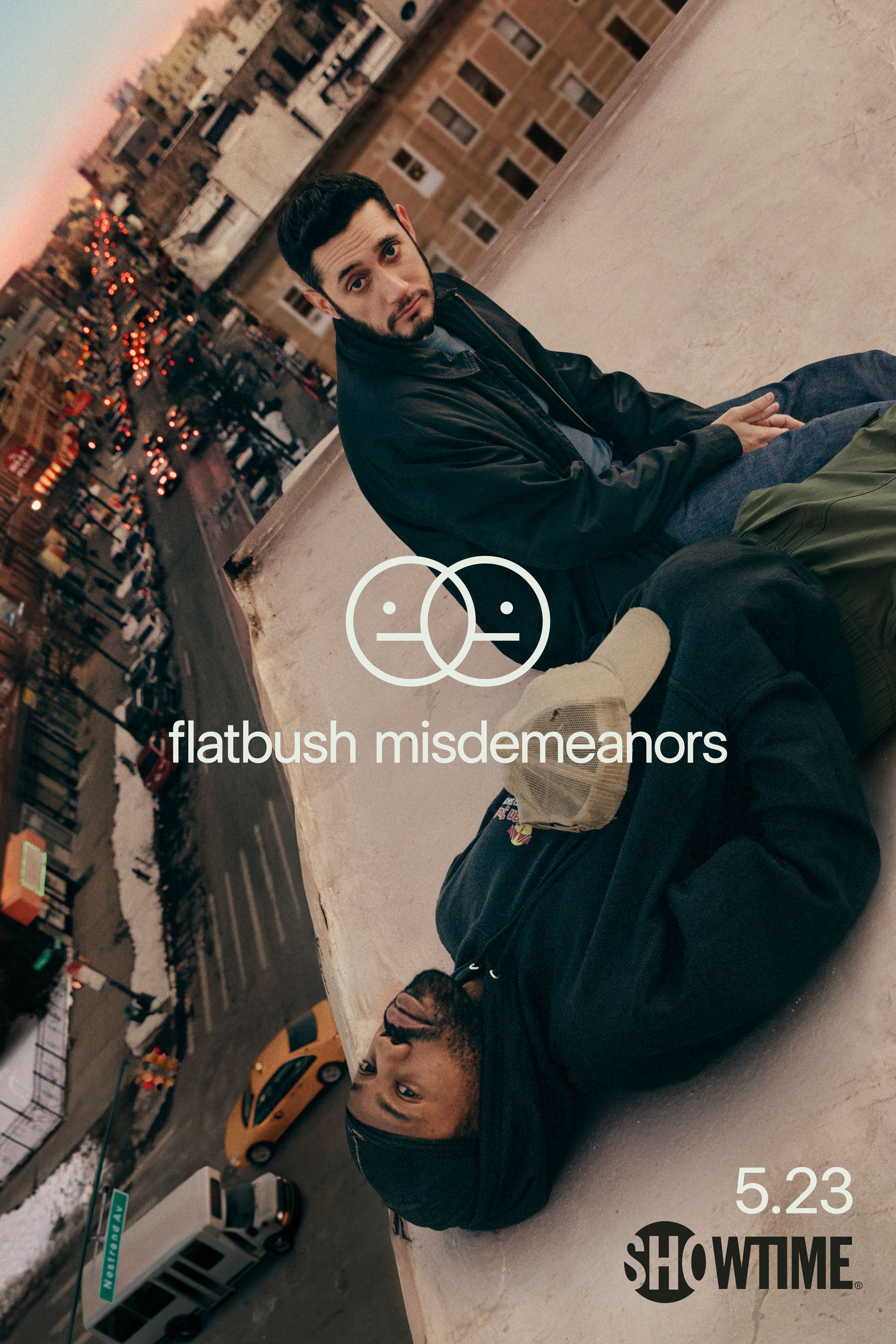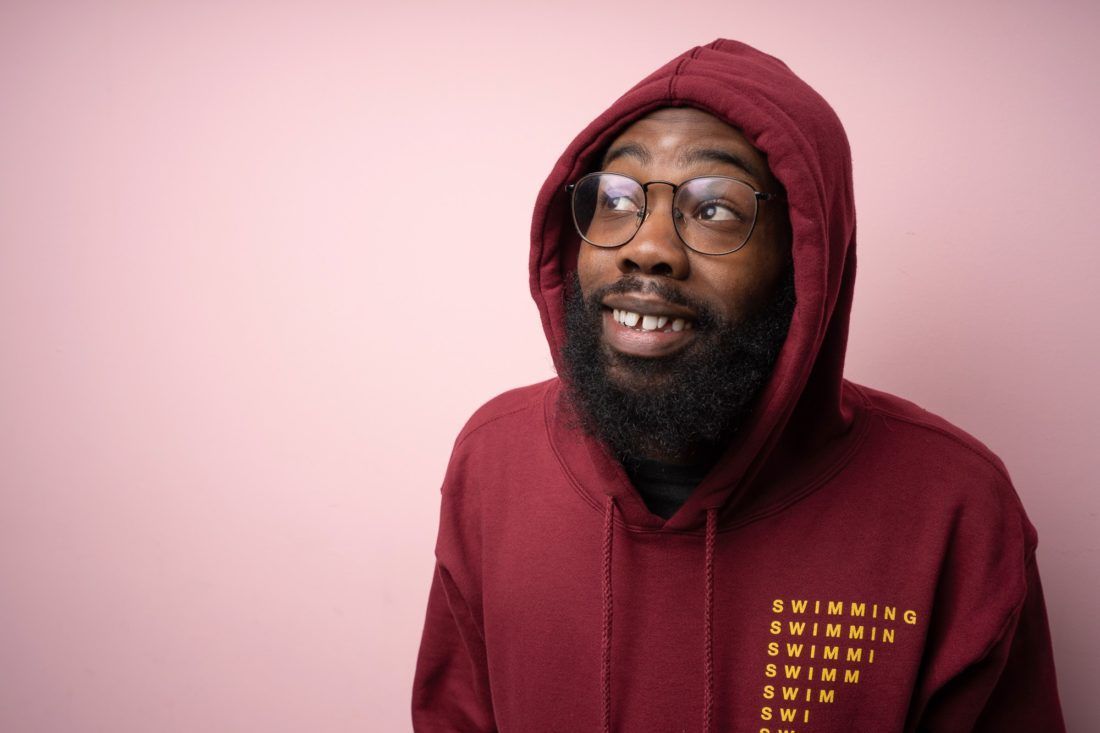It’s Showtime! Flatbush Misdemeanors


From the opening moments of Flatbush Misdemeanors, Brooklynites will feel right at home. After a shot down Flatbush Avenue, the opening scene set behind Erasmus High School introduces Dan and Kevin, childhood friends around the age of 30 navigating their inner turmoil amidst the characters and chaos of life in Brooklyn.
Starring and written by stand-up comics Dan Perlman and Kevin Iso, the show was originally a series of shorts published online, which later drew acclaim at film festivals. In the show, Dan plays a high school teacher while Kevin, an artist, crashes on his couch while working food delivery jobs.
“We wrote it as a pilot, initially, but it was tough for people to get what we were doing,” Perlman said in an interview with Bklyner. “It was helpful to shoot the shorts as proof of concept.”
Perlman hails from the Upper East Side, but with friends spread across the city from the Bronx to Bayside, Queens, he “was lucky to not have an insular upbringing.” Iso, meanwhile, moved from Houston to New York to pursue stand-up. When he got here, he was amazed by the diversity of cultures, especially in the Flatbush area.
“When you see Black on television, a lot of times it’s like, oh that’s just Black,” explained Iso. “But there’s Black people that speak French, French Creole, Spanish. To see them all intersect, I’ve never seen that until I came here. It’s beautiful.”
This organic coexistence of cultures was a major inspiration for setting the series in Flatbush, where both men now live in real life. The characters’ paths become intertwined with that of Drew (played by Hassan Johnson of “The Wire”), a drug dealer and customer of the restaurant where Kevin works, who also happens to be the uncle of one of Dan’s students, Zayna.
The show premiered on May 23rd on Showtime. The following interview has been edited for clarity and length.
How did the deal with Showtime come about?
DP: The film festivals were super helpful because it’s not like it got a million views; neither of us is a social media influencer. The film festivals helped give it credibility. We were lucky to have a few networks interested, but Showtime seemed really excited about the show as it was and seemed to get its tone and liked us as creators, so it was a really good fit from the jump.
What was the biggest challenge in adapting the web series for Showtime?
DP: It was figuring out how to maintain that lived-in tone while filling the story and going deeper with the characters. We like all the other characters so much so it was fighting that instinct to always drift to the other characters. But once you figure out how to go deeper with the characters that exist, that opens up more room for the story.
KI: The web series was more controlled; you didn’t have a bunch of cooks in the kitchen. It was me and Dan and the actors, and that’s it. But once you go into television, it’s a lot more people.
What was the most rewarding part of that adaptation?
DP: The coolest part for me was that so many of the comics that we worked with on the web series were just doing it as favors because they’re our friends. To be able to use them on Showtime felt really cool—all these people helped us get here, we were still in this experience with them. Like Kerry Coddett who is a writer and plays Jasmine on the show, Kareem Green who plays my step-dad, and Napoleon Emill, the guy playing the goose game, so many were in the initial web series.
KI: This cast is amazing. Hassan [Johnson] and Kareem are fantastic; everybody likes talking about them. But the child actors like Kristian Dodson (Zayna), Zuri Reed (Dami), and Mason Bleu (Will), man, they’re the heartbeat of the series. They really make people love it.
I’m very happy that we were able to expand Zayna’s story. We didn’t have the resources to do that in the web series or that experience because we’re writing from somewhere so personal.
Her character has to be coming from somewhere extremely personal as well and neither Dan nor I have been a teenage Black girl.

How did you write a character where you don’t share that experience?
KI: All I know is the girls I grew up with and how I treated them as a boy, reflecting and trying to see it from that point of view. That story [where Will and his friends spread a rumor about Zayna], I did that to a girl, helped spread a rumor. I was so insensitive as a kid that I didn’t even think about her feelings. The flip side is where the fun comes in because you get to dissect it, it’s like therapy in a sense. Kerry Coddett, who is a writer in the room, helped a lot in what Zanya’s mindset would be and who she actually is to her core. It was a great collaborative effort.
How do you strike a balance between comedy and issues like race and gentrification?
DP: We’re comics so the jokes are always there. You just don’t want to go too far and undermine the serious moments because you’re afraid of being sincere. It’s thinking about the characters and the story first and letting the issues live underneath that. We never decide, “this is going to be a gentrification episode” or “this is going to be an episode about racism.” It’s like, what is true to the characters, and then the issues are all underneath it. We don’t talk about race on the show but it’s so there. We don’t have to invoke these buzzwords.
KI: Comedy comes from the pain and all of that important shit. It’s hard to tell a joke about something I don’t care about. I’ve always been impressed when somebody writes a joke about birds or something, and I’m like, “how did you make that funny?” The only way I can say something is if I have something that bothers me. It’s on your mind and you wanna laugh at it, you want to poke a hole in whatever it may be.
Both characters suffer from depression. How do you find the comedy in that without also belittling it?
DP: I’ve dealt with it in real life and I’ve always loved talking about it in stand-up. I had a bit where I talked about a time where I called a suicide hotline, which is very scary the first time, but once you figure out how to talk about it in a way that is funny but still hits the seriousness of it, it becomes the most rewarding stuff to talk about. A lot of my favorite comedians can do that. Maria Bamford, who plays my mom on the show, does it so well, it’s always inspiring when comedians do that. It’s such an important thing that could easily be preachy or just be fully ignored.
KI: It’s like racism. It’s a very serious issue but Black people have found a way to laugh at it. We find a way to get by. Whereas that’s why we get so upset when a white person tries to make a joke about it. Like when Joe Biden said anyone who didn’t vote for him “ain’t Black,” everybody was like, “Who the fuck are you?” But if a Black person said some shit like that, it would be like, “It’s actually kind of funny that he said that” [laughs]. That’s the same thing with depression.
Have you ever done food delivery before?
KI: I did it like twice—I was on Uber Eats and the money was awful. I walked dogs, which is actually more intimate because you’re in the person’s apartment. We couldn’t use that because of all of the animals.

What is it like starring in something for which you also are the writer? Does that make it difficult to step back and know what needs to be improved?
DP: I’m always comfortable criticizing myself, but it’s a lot of different hats to wear. You care about every piece of it—I’m as invested in a scene that I’m not a part of as I am when I’m in the scene. But the lucky thing is that even though it’s a lot of us, we had so many other people who were there to collaborate and make it a full thing, from the cinematographer and our directors and our showrunner—all these people helped build the world and that made it easier for us.
Why did your characters share your real names? How close are they to the real you and are parts of the show autobiographical?
DP: We chose our real names because they are so close to our personas that it would have felt funny to have a character that feels like 75% me and then just calling him Jeff. As far as autobiographical, it’s sort of like The Things They Carried, it’s story-truth versus happening-truth. A lot of it feels emotionally true. I studied education and thought I would teach so it’s like, Oh this is how I would react as a teacher. It’s all true even if it didn’t happen. The conversation where I tell Kev he should go to therapy, that came from a real conversation. We didn’t want to play comedians, we wanted to have us exist in the world because that felt more real and freeing.
KI: Well, we chose it cause we were lazy [laughs].




